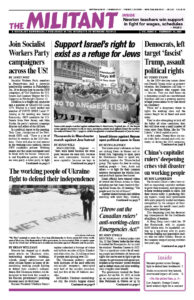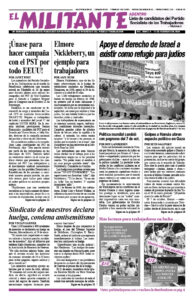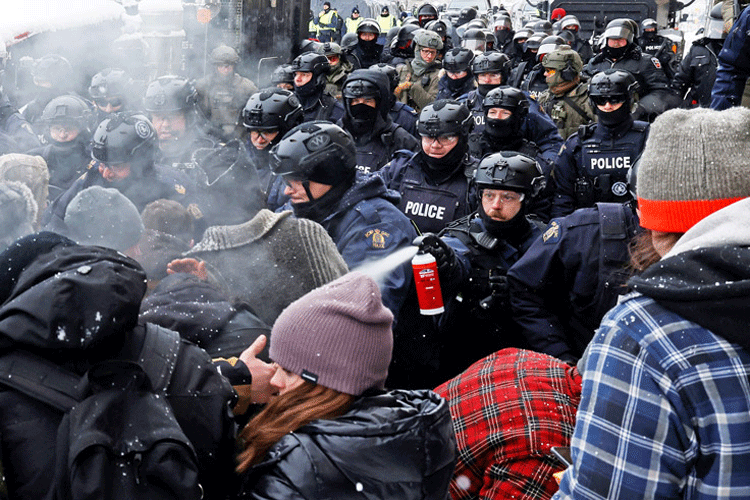MONTREAL — A federal judge ruled Jan. 23 that Ottawa broke the law when it invoked the Emergencies Act to crush the truckers’ Freedom Convoy in 2022. This is a significant victory for all working people and defenders of democratic rights that can be used to fight to get the charges the government laid against participants in the truckers’ protest dropped and to defend union and other working-class struggles more broadly.
The government invoked the Emergencies Act on Feb. 14, 2022, to break up an encampment outside the Canadian Parliament in Ottawa set up by truckers to protest job-threatening federal COVID mandates. Many had their trucks seized and bank accounts frozen in one of the most sweeping acts of government repression in decades.
The Justin Trudeau government has tried to justify its use of the Emergencies Act by fraudulently claiming the truckers’ protest was a threat to Canada’s “national security.”
Federal Court Justice Richard Mosley said that as a result of the truckers’ convoy, “the harm being caused to Canada’s economy, trade and commerce was very real and concerning but it did not constitute threats or the use of serious violence to persons or property.”
The government’s use of the act to bust up the truckers’ protest “would open the door for any sufficiently disruptive event — say a legal strike at a port — to be deemed a threat to national security,” wrote the editors of the Globe and Mail Jan. 24.
Mosley said that the government’s freezing of bank accounts of convoy participants, and its imposition of “no-go zones” in Ottawa during the protest, were violations of Canada’s Charter of Rights and Freedoms.
But Mosley also ruled that the government’s use of the Emergencies Act did not violate freedom of association and freedom of peaceful assembly.
The government says it will appeal the judge’s decision.
In justifying its use of the Emergencies Act, the government convened months of hearings last year. It insisted that it had been advised — in documents never made public — that it had the power to reinterpret the text of the act as it saw fit to put down the protest.
The Communist League made a written submission to the commission, rejecting not only the use of the Emergencies Act against the truckers, but also calling for the law’s repeal.
“The court decision has ripped the mask off Trudeau’s dishonest and cynical maneuvers and his regime’s use of the bogus charge of a ‘national security threat,’” said Steve Penner, organizer of the Communist League at a Jan. 27 Militant Labor Forum in Montreal. “That’s just a euphemism for threats to the profits and powers of Canada’s billionaire capitalist rulers.”
The Emergencies Act was adopted in 1988 to replace the discredited War Measures Act. That law had been invoked in 1970 to arrest without charge hundreds of trade unionists in Quebec, fighters for Quebec independence, artists, civil libertarians, socialists and communists, with the goal of crushing rising union battles and the movement for Quebecois national rights.
“Ottawa imposed the Emergencies Act to set a precedent for its future use against working people and the oppressed,” Penner said. “And our ability to defend ourselves through unions, working-class political parties and other organizations.”
Encouraged by Ottawa’s success in using the Emergencies Act against the truckers, the Ontario government adopted Law 28 banning a strike by 55,000 education workers. But Canadian Union of Public Employees members defied the law, backed by the threat of a general strike by the Ontario Federation of Labor and growing support from working people across the country. The government was forced to retreat and repeal the law.
In face of a strike at 30 west coast ports by 7,400 members of the International Longshore and Warehouse Union last July, boss associations called on the federal government to impose back-to-work legislation. Trudeau threatened to do so, but backed off. The port workers ended up making significant gains through their fight.
“In light of the federal court decision, the unions and all defenders of democratic rights should use this opening to press for the immediate withdrawal of the 393 criminal charges laid against 122 Freedom Convoy participants, and an end to the frame-up trial of Freedom Convoy leaders Tamara Lich and Chris Barber,” said Penner.
Lich is a former leader of the Maverick Party and Barber ran a trucking company in Saskatchewan. Both were released from jail under draconian bail conditions.
Lich spent a total of 49 days behind bars despite not being convicted of any crime. At her second bail hearing she was brought to court in shackles. An outraged Superior Court judge ordered the shackles removed and that she be released.


